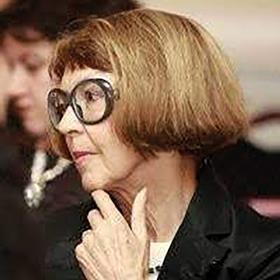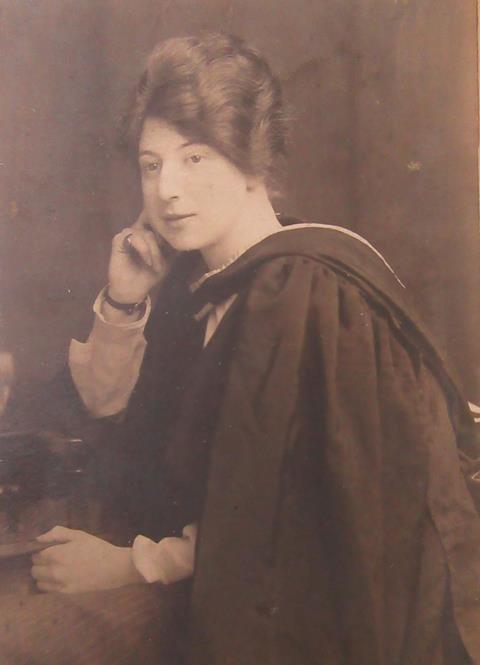In 1957 only 356 women solicitors held practising certificates in England and Wales. One of these was Agnes Twiston Hughes (pictured below), who in 1923 became the first Welshwoman to qualify as a solicitor.

Agnes was born in Conwy, north Wales, in 1895. She was the younger of two daughters of Elizabeth Harriet Davies and John William Hughes, themselves of Welsh parentage. Many of the early women solicitors were trained in their father’s firm but few, if any, were so closely influenced by their father’s beliefs and ambitions.
John William Hughes left Wales at 19 to work as a clerk in a solicitor’s office in England. In 1903, aged 41, he qualified as a solicitor. The following year he purchased a former pub building in the centre of Conwy where he practised alone until being joined by his newly qualified daughter in 1923.
Motivated by a strong belief in the value of education, Hughes sent both Agnes and her elder sister Evelyn first to the Welsh Girls’ School in Ashford, Kent, and then to Bangor County School. Both women subsequently graduated from the University of London, with Agnes’s BSc in economics undoubtedly proving useful in her subsequent career.
Leonardo da Vinci is credited with the maxim ‘Poor is the pupil who does not surpass his master’. Agnes may not have surpassed her father’s achievements but she certainly equalled them. She inherited his determination and impressive ability to pass exams.

Hughes was awarded several prizes in the 1903 Law Society Finals, including the Clement’s Inn prize. Twenty years later and trained by her father, Agnes was awarded five prizes, including the Clement’s Inn prize, when she came first out of all candidates, male and female, in the 1923 finals. Not until 1948 did another woman (Dorothy Craik) come top of the finals honours list.
In addition to intellectual competence, Agnes shared with her father a strong desire to help others, whether those who sought her legal advice, her community in general or her extended family.
She was equally at home dealing with contract law or standing before the Colwyn Bay magistrates defending a man charged with bigamy. Her involvement in legal work relating to adoptions led to several adopted people returning to Conwy looking for her, believing that she was actually their birth mother.
As well as being a member of the Solicitors’ Benevolent Association and her local Law Society, Agnes was regarded as a ‘generally formidable force in the town’, well respected for both her legal expertise and concern for local improvement. This was recognised in 1954 when, five years after the death of her father, she became the first woman to be appointed mayor of Conwy Borough Council, the same council of which her father had been an alderman.
In common with both her parents Agnes devoted much of her time to the good of Conwy and the wider community. She was a county organiser of the Women’s Voluntary Service for Civil Defence in Caernarfon and campaigned to save Thomas Telford’s 19th century Conwy suspension bridge from demolition after it was made redundant by the newer 1958 bridge. Telford’s bridge is now a National Trust property.
Like her father, Agnes had a strong conviction of the verity of her own opinions and her acerbic tongue reduced at least one male councillor to tears. In later life many men regarded her as ‘that old battle-axe’. When mayor, Agnes insisted on changing the venue of the annual civic service from the Anglican parish church of St Mary & All Saints to the Welsh Methodist chapel where she, and her family before her, had worshipped.
But many others were grateful for her generous nature and strong family feelings. This included Dorothy Metcalfe, another local woman solicitor, who considered Agnes ‘very helpful’, and the five daughters of her mother’s first cousin who were left orphaned in 1932. To them Agnes, her sister and her parents provided considerable support and assistance.
Her recreational interests were also recognised. As well as being a talented bridge player, Agnes played ‘a lot of golf’ at the Conwy Golf Club and in 1948 was chosen as the club’s lady captain. A photograph of Agnes in her mayoral robes still hangs in the clubhouse.
On the death of her father in 1949 Agnes became the family firm’s senior partner, a position she held until retirement in 1961. She died in 1981, still living in Coed Celyn, the house where she was born, having built up a practice where she was able to leave £308,948 to various family members.
The character of this ‘tall buxom woman’ was summed up by her first articled clerk, Janet Corke: ‘She could make you tremble in your boots. The day I qualified I went to see her sitting behind her desk in six cardigans; the office was unheated and the windows were open because she smoked like a chimney.
‘I saw her once again, at our wedding reception, dressed in a well-cut suit and slightly more frivolous hat, standing alone, cigarette in one hand, a glass in the other, tall and confident, ready to take on the world – a remarkable feminist in the best sense of the word.’
Elizabeth Cruickshank is a former chairwoman of the Association of Women Solicitors, was the first editor of Link, the magazine of the AWS, and is the author of Women in the Law































No comments yet